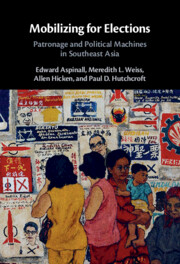Book contents
- Mobilizing for Elections
- Mobilizing for Elections
- Copyright page
- Contents
- Figures
- Tables
- Acknowledgments
- Terms and Acronyms
- 1 Patronage and Political Machines in Southeast Asia
- 2 Historical and Institutional Foundations
- 3 Mobilization Networks and Patterns of Patronage
- 4 Targeting Individuals: Don’t You Forget about Me
- 5 Targeting Groups
- 6 Hijacked Programs
- 7 Patronage and Identity
- 8 Subnational Variation
- 9 Conclusion
- Book part
- Bibliography
- Index
7 - Patronage and Identity
Domesticating Difference
Published online by Cambridge University Press: 04 August 2022
- Mobilizing for Elections
- Mobilizing for Elections
- Copyright page
- Contents
- Figures
- Tables
- Acknowledgments
- Terms and Acronyms
- 1 Patronage and Political Machines in Southeast Asia
- 2 Historical and Institutional Foundations
- 3 Mobilization Networks and Patterns of Patronage
- 4 Targeting Individuals: Don’t You Forget about Me
- 5 Targeting Groups
- 6 Hijacked Programs
- 7 Patronage and Identity
- 8 Subnational Variation
- 9 Conclusion
- Book part
- Bibliography
- Index
Summary
This chapter focuses on how patronage politics interacts with the politics of identity, notably ethnicity, religion, gender, and class, across Indonesia, Malaysia, and the Philippines. The chapter highlights rich variety of forms of patronage politics across these categories, co-existing with underlying similarity in function. Politicians cater to a wide range of social identities and target varied identity groups with patronage, showing immense creativity when doing so. But the underlying goal of such politicians across our highly diverse, multi-ethnic, and multi-religious contexts is fundamentally the same: to capture more votes using offers or promises of patronage. This instrumental process generally reinforces rather than erodes existing social identities (except, the chapter points out, those based on class, which clientelist politics tends to undermine by connecting lower-class recipients of patronage to higher-status dispensers of it). Even so, particularly where electoral systems encourage broadly inclusive strategies, patronage distribution regularly crosses identity-group boundaries and thus tends to bridge divides rather than promoting deeper within-group bonding.
Keywords
- Type
- Chapter
- Information
- Mobilizing for ElectionsPatronage and Political Machines in Southeast Asia, pp. 176 - 203Publisher: Cambridge University PressPrint publication year: 2022



